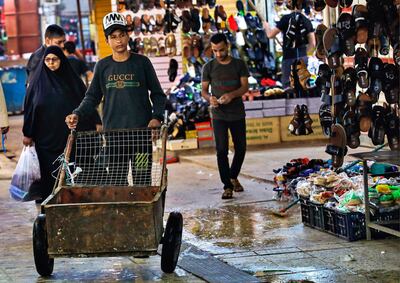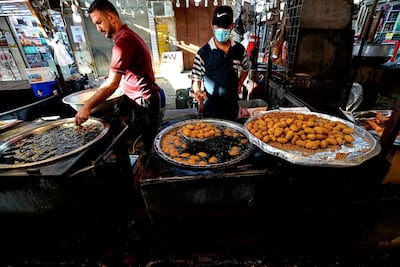When Iraqi soldier Thul-Faqar Abdul-Wahab didn’t get his August salary on time, he thought it was just a temporary situation.
But after more delays to the following months’ paychecks, Mr Abdul-Wahab worries it has become a norm that will make his life even worse.
"I don't have a penny in my pocket now," the 35-year old told The National. "I have not received my September salary yet and I don't know what to do with my bills."
As the cash crunch in Iraq grows more acute, the government has defaulted on basic payments that include salaries of millions of civil servants, pensions and welfare payments, fuelling the growing anti-government sentiment among an increasingly desperate population.
Iraq is among the countries hit hardest by the global slump in oil prices, with oil revenues making up nearly 95 per cent of state income. The war-ravaged country has seen revenues slashed by about 50 per cent this year.
According to Oil Ministry figures, the country has earned around $34.072 billion so far this year, nearly half the amount projected when the 2020 budget was drafted.
Finance Minister Ali Allawi has said that the government runs with a monthly deficit somewhere between 4 to 5 trillion Iraqi dinars ($3.4-4.2bn).
To bridge the fiscal gap, it has borrowed 15 trillion dinars from local banks as well as $5bn from international lenders. But this only covered three months' spending.
Since September, the government has been trying to convince parliament to endorse further borrowing of 41 trillion dinars, but has failed so far.
The sum is meant to cover expenses for the rest of the year and the first quarter of 2021, to cover any delay in approving the next budget.
"That amount is huge and the numbers are exaggerated," Jamal Kojer, a member of parliament's financial committee, told The National.
Mr Kojer says the opinion inside his committee is to approve no less than 11.5 trillion dinars and no more than 20 trillion dinars to cover salaries, pensions, welfare and other commitments for the rest of this year.

The legislative body is expected to debate and approve the relevant bill mid-next week, he said.
Until then, Mr Abdul-Wahab and many others are left with little choice but to borrow from friends and family to make ends meet.
Nearly three quarters of his monthly salary of 1.4 million dinars goes towards rent, medical treatment for his brothers and wife, and private electricity.
“I have financial commitments that need to be met every month and can’t be delayed. My situation is terrible,” he said.
“Politicians and political parties have wasted money all these years and the parliament and government are still fighting while we are in the middle waiting.”
Lack of money has caused a nearly three-week delay in payments, Mr Allawi told state TV late on Wednesday.
He warned that if the bill for new borrowing was not approved next week, then the salaries would be delayed for up to five weeks.
Some six million Iraqis are government employees or receive pensions and social benefits and about 122 per cent of this year’s forecast oil revenues was expected to go towards public sector salaries, Mr Allawi said.
After the 2003 US-led invasion that toppled Saddam Hussein, Iraqi political parties pressed for hefty compensation and social benefits for victims of the former dictator’s policies, securing government jobs for their supporters and eroding government revenue in the process.
“If the government fails to put control on salaries and pensions it will reach a dangerous fiscal situation in the coming years,” Mr Allawi warned.

The delay in payments is fuelling anger among Iraqis who have been protesting since October last year against the political elite, rampant corruption, lack of jobs and poor public services.
Some employees on social media are calling for a general strike if their salaries are not paid by November 8.
Mr Abdul-Wahab, who works as a border guard on the Iraq-Syria border, says he will join the strike.


